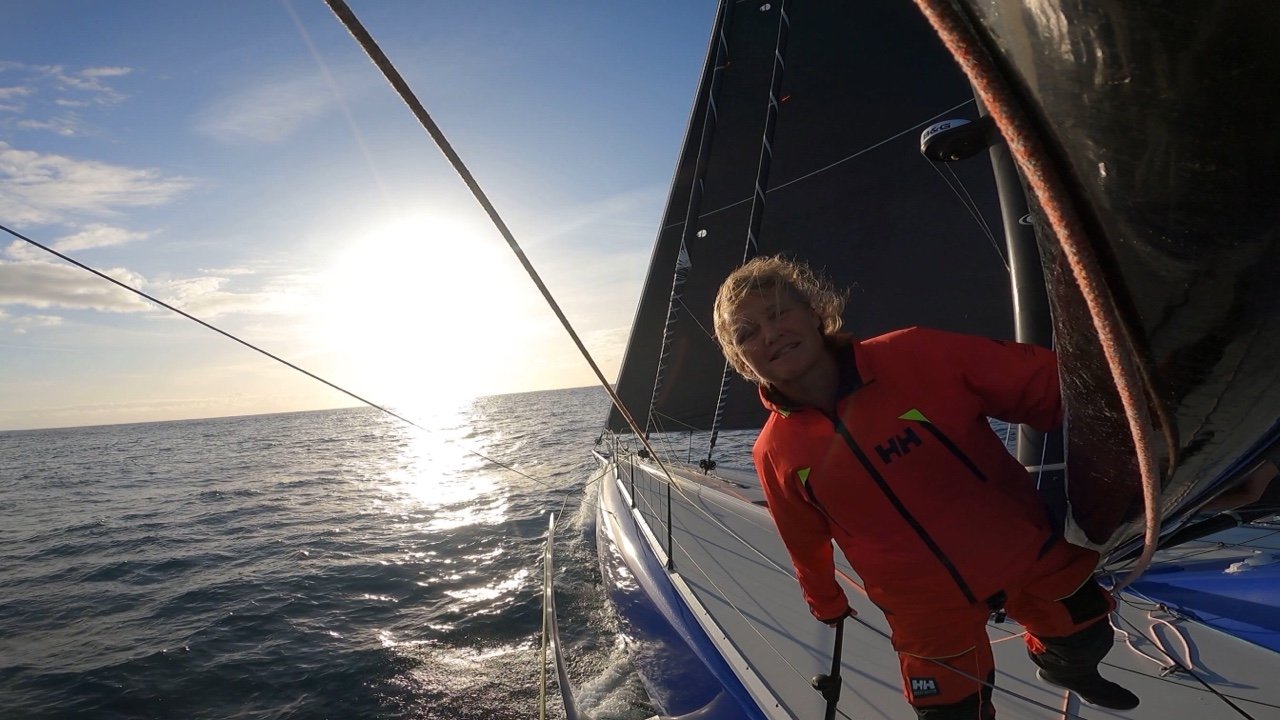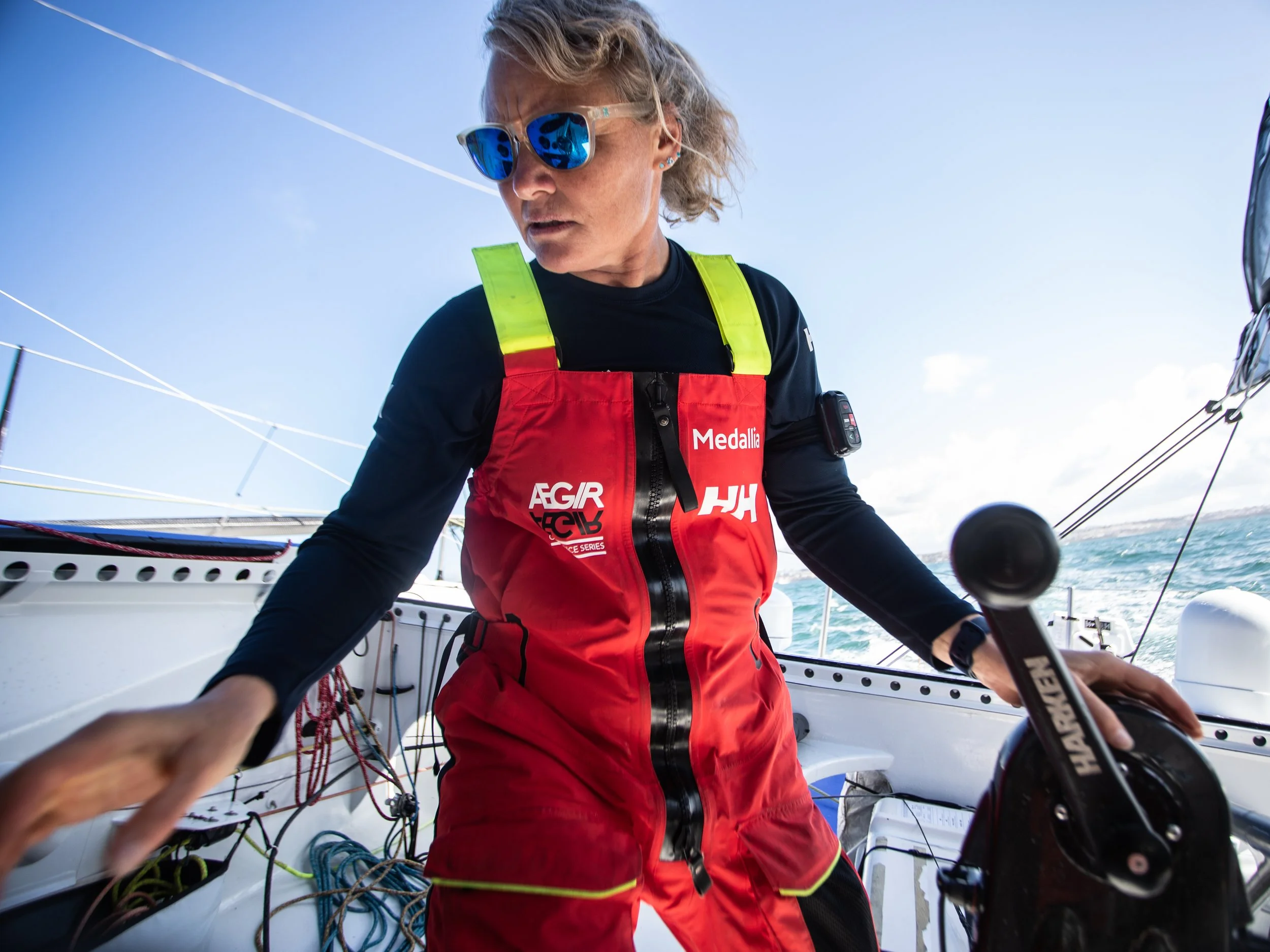Bermudes 1000 Q&A
The first race of the season, the Guyader Bermudes 1000, is complete! Pip finished the race (which was her first solo race in the new Medallia) earlier this week. In this Q&A she answers your questions from across social media…
The first race in a new boat. How did the ropes perform?
Going into the first race we wanted to make sure every part of the boat was as strong and resilient as possible and upgrading all our running rigging over the winter was an integral part of that plan. We specified all the rope on the boat to be as strong and low stretch as possible - by making sure we have the right rope in the right place at the right time it makes it easier for me to perform. It also means that all of the effort and the load in the boat are transferred into speed rather than friction or stretch so we get the most out of the boat in that respect. Working with superior level technical products makes such a huge difference.
Have you bonded with Medallia yet?
Very much so yes! I feel like I understand the boat a lot more and I feel like I understand what the boat needs from me to go fast. There’s still a lot of work to do but I very, very, much bonded with it.
What was your strongest emotion in this race?
Disappointment unfortunately!
What are the different challenges you found in racing the new Medallia compared to your previous boat?
The type of challenges are the same but they are proportionally different. The boat is still physical to sail but in a different way - there are more variables to manage so with the older boat it might have been five variables to try and get the best performance from it and now it’s ten variables. That means I have to expand my problem solving as some of those new variables aren’t as ingrained as the ones I’ve been working with all my life - things like foil rake and mast rotation are new and I sometimes need to remind myself to check those variables and get them into my routine to make sure I am getting the the most out of the boat.
Key lessons learned?
On the second leg from the turning way point up to the Fastnet I was able to really turn things around and move up the fleet - I reminded myself that there is always an opportunity to come back, always a chance to turn things around which is a really important thing to remind yourself. My biggest learning was around the start and the first 12 hours - being better prepared, giving myself more time before the start to really get my head in the right place.
Any incidents of debris around foils, keel, rudders, fishing nets, plastics , buoys?
Not in this race but we were warned by the race committee as we came into Finisterre of reports of a load of wooden planks that had fallen off a ship into the sea and Louis Burton also told the fleet about a big weather buoy and gave us the position so we knew to avoid it.
After rounding the Fastnet mark and heading south with the group you broke out, tacked to port and started slowing down. What made you decide to turn?
There was a front that we all had to cross and I decided to cross it early in a lighter wind because when you cross the front late you are in quite an aggressive sea state with a very sudden change to manage - you have to tack the boat and move all sails from one side to the other and get another sail up in the air in a really short amount of time. The further south you did it then theoretically yes it was quicker to do it there but it would also have been much much harder to do the work because the boat would be bobbing around like crazy. So it would have been much more physically demanding and I was in quite a lot of pain with my back and I decided I would rather lose an hour of wind and make that transition and do all that physical work in easy conditions so when the wind came in I’d be fully ready to just go. That's one of the decisions I’m really pleased I made because for me, in those circumstances, it was the right thing to do.
Can you explain the reason for the penalty and rationale behind the duration of it in the race?
When we start a race we have to seal the propellers to stop the motor from being able to move the boat. On my old boat I used to seal the gearbox so it was impossible to put the engine into forward gear. On this new boat we sealed the propeller shaft which wouldn't stop it from spinning but if the prop shaft did spin the seal would break and then the jury would know that we had engaged the engine. I accidentally put the engine into forward when I started it instead of neutral - I made a mistake in the dark with my gear lever which meant the seal broke on my prop shaft. At the time the boat was doing 20 knots so putting the engine into forward had absolutely no impact on my performance but, as I had broken the seal, I had to have a penalty. It’s actually a fixed penalty of 90 minutes regardless of whether you benefited or not and regardless of the circumstances it happened in - it's a 90-minute penalty and it hurt!
How do you pull yourself back up mentally when bad stuff happens?
It is difficult, especially when you're on your own, getting out of the cycle of beating yourself up over problems that you have created yourself. But I just keep thinking about opportunities to change things and make things better and that I’m the only person who can do that - it has to come from me. So you have to keep reminding yourself when things aren't great or you're feeling negative that I am the only person who can turn it around and I do have that opportunity to turn it around.
What was your scariest moment?
Having the fall across the cabin was scary when I landed - I didn't know whether the boat was wiped out or how badly I'd hurt myself - so for a split second you just think what have I done! But then you realise everything is okay and have to start thinking about what to do next. I'm always scared by the unknown so the thought of falling across the cabin is actually scarier than doing it, so now it has happened I'm not so scared of it, but I will be more prepared to avoid it next time.
How's the eye?
Not quite gone yet, it’s still quite colourful.
Has technology made racing easier or more frustrating?
In some ways it has made things easier with the ability to look at the weather and look at the rest of the fleet as I can use that external feedback to monitor and improve my performance. However, I don’t personally need that external motivation of looking at others. My motivation comes from within so you need to balance this external feedback to make sure it is having a positive effect (when used properly it can be helpful).
Fastest speed reached in the race?
28.2 knots
Are you racing for the Ocean Race 22?
No we won’t be.
Are you happy with the performance of Medallia?
I really really am. Medallia is an incredible boat. It’s really diverse in its ability to perform across a range of conditions. It takes off speed easily and it manages tough conditions easily and I think that all the work that we have done and all the incredible technical suppliers we have brought on board to help with our performance this year has made a strong, fast and resilient boat.
What was your biggest takeaway for future training?
The next chunk in my development is looking at getting the most out of the boat in moderate conditions, We have been focusing on the bigger breezes and how we get the boat going like a train - that was behind the reason going to Portugal and we really used that time well and performed well in those big breeze conditions. The next segment of coaching and training will be about getting the most out of the boat in lighter or moderate air.
What was your best/worst meal onboard?
I enjoyed it all (I don't take food I don't like)
Did you enjoy the race?
I always enjoy it and I have the most incredible job in the world but I did want to do better. When you come away thinking I didn't do the best I could have done it does take the edge off.
I'm about to buy a Mini 6.50, what's your advice about starting a campaign?
Absolutely amazing, brilliant boats, brilliant community, you'll have a great time! My advice is get out on the water as soon as you can and get out racing as soon as you can - don’t worry about things being perfect just get going, it’s all about getting out on the water and getting cumulative mileage.
Were there any particular moments of the race you enjoyed?
Charging up towards the Fastnet block was just unbelievable, the boat was flying and in its element, at the extreme pushing the limits end of what we do in sailing. It is just this unbelievable blend of adrenaline and anxiety and excitement and it's just amazing, I loved it!
What was the best gain in terms of manoeuvres?
I was gybing really quickly and really well which I was pleased with. The best thing I did tactically was round the last way point I did a really good leg inshore to Finisterre, I went further inshore than everyone else and made good gains there.
Your boat seems to be the only one with a sliding roof - why are the other boats from that gen fixed?
It’s personal choice but I inherited that roof, which was originally Banque Populaire and if you look at the Vendée 2020 Clarisse Crémer also had a sliding roof as well. Some people go for a fixed roof as it is a wet boat and they prefer to be under cover all the time. For me though, I really like the ability to push the roof forward and just look up and see the sails and see the sea and have that real contact with the elements around me so I think I will keep the sliding roof but it’s just personal choice.
Why were you so incredibly hard on yourself this race?
I want to do better and I know I can do better. These opportunities are unique and you don't get them every day so I was frustrated that I didn't make the most of it.
What are you going to do to prevent the engine going into a gear during a race?
Double seal it - we will seal the gearbox as well as prop shaft.
What is the most annoying noise on the boat?
The engine - when I can't use the hydrogenerators I have to charge using an alternator on the engine and that noise gets very annoying.
I was surprised to see so much water swirling around on deck and into the cockpit? Is it really a drier ride than the first Medallia?
Very much so - it's at foot level rather than head level. I'm happy to paddle.
What became of Doug?
(For anyone that doesn’t know who ‘Doug’ is - he’s a plant Pip took onboard as a race mascot who perhaps didn’t bring the best luck)
Doug and I have had a conscious uncoupling. I was very tempted on many occasions to throw Doug in the sea, however, I couldn’t bring myself to do it so he has been adopted by Melanie, our Campaign Support Manager, so he’s moved ashore and he will have a much happier life there.
What are the positives that you have taken from the first race?
The boat is incredible. The technical team have worked so hard to make it strong and resilient and fast and they have done an incredible job - we have a weapon on our hands. The sails are great and I definitely have cracked the code of the dynamic around foiling, so I understand how all of that works and this is a good platform to build from.
Is the foiling boat more demanding on the body or is it a more stable platform?
I don't think it is any more demanding when any of these IMOCAS are going - being on board is a rough ride so when we are up and running it's about the same. The thing that is difficult is the sudden stop stuff like ploughing into a wave, the deceleration is quite aggressive and that’s what’s difficult.
How do you stay focused on the big picture and how do you motivate yourself to get back "in the zone" for the next race?
You've got to have a proper debrief, unpick and understand what you did and pull out the lessons to be learned and then draw a line under it and move onto the next one. The next one is a much longer, totally different race and I have the ability to learn from this one and move on. It's not an easy thing to do, to just switch to another race, but we are only moving forward and you can't move forward while you're looking back. Learn from what's happened and move on.
Is there anything you’ll do differently in your next race?
More time before the start to get my head in the right place and work on that transition into race mode to get my onboard mojo sooner.
Is sailing the new boat a whole new skill set for every aspect of sailing?
No, it's all essentially the same, it's just taking the skills I already have and elevating them. With sailing you never know it all, there are always conditions you've not experienced before so you will always be learning but the boat level skills are always the same.
What do you miss most when you’re racing?
Nothing - I'd rather be racing!
Potentially how fast is this new boat?
I've made it to 29.6 so far, Louis Burton (who previously had the boat) has had it over 30 knots and I think it could make 35 knots.
Do you think they should allow foils on the rudder to allow the boats to fully foil clear of the water? Do you think we will ever see this?
People have been experimenting with it but as a class we have decided not to allow it for the time being. If we allow too much development in the class too quickly it will make things too expensive too quickly. Teams won't be able to keep up with those super well-funded teams if we keep changing the designs over and over and it will make older boats obsolete more quickly so the class decision to limit the development for the time being is sensible, but I’m sure in the future we will see things like that.
Did you not use the same hydro generators as the Vendée?
No, these one are made by the same company but these are internal, in the Vendée they were hanging over the back of the boat - these ones are like turbines inside the boat.
Why was it so easy to accidentally break the engine seal if it is regularly required to charge the batteries?
Because we focused on sealing the prop shaft and not the gearbox. We won't do that again, lesson learned.
What is your biggest takeaway from the Bermudes 1000?
I want to focus on moving in light to moderate air.
Is there a reason for the black sails instead of white sails?
They look darker now as they are made in a slightly different way - it's just the type of manufacturer process.
What’s the biggest lesson learnt from racing that you didn’t get from training?
Being with other boats is so valuable, watching what they do, what they put up - training on my own I’m in my own bubble and my yardstick for doing well is based on my own performance, but racing with other boats gives me something to gauge me level of performance against.
Head over to our YouTube channel to watch all the action from the race and stay tuned for the next one - the Vendée Arctique in June.


